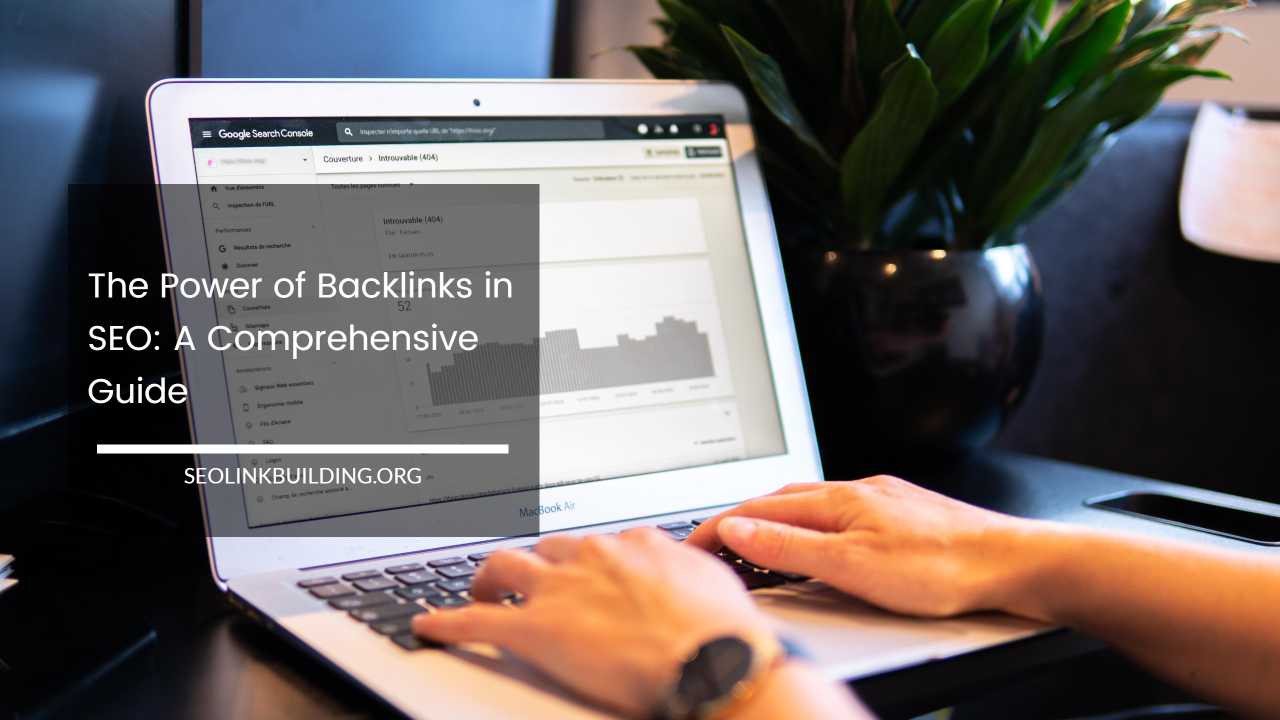The Power of Backlinks in SEO: A Comprehensive Guide

Backlinks in SEO
In the vast and ever-evolving landscape of search engine optimization (SEO), one element consistently stands out as a driving force behind ranking success: backlinks.
Backlinks, also known as inbound links or incoming links, are a crucial aspect of SEO that can significantly impact a website’s visibility and authority in search engine results.
In this comprehensive guide, we will delve deep into the world of backlinks, exploring what they are, why they matter, how to build high-quality backlinks, and the role they play in shaping the digital marketing landscape.
Understanding Backlinks
Backlinks are hyperlinks from one website that lead to another. They serve as a reference, pointing users and search engines to valuable and relevant content across the web.
Think of backlinks as digital votes of confidence or endorsements. When one website links to another, it essentially vouches for the linked site’s credibility and authority.
Types of Backlinks
Not all backlinks are created equal. They can be categorized into various types, each with its own characteristics:
- Natural Backlinks: These are earned organically when other websites find your content valuable and choose to link to it without any incentive or request.
- Manual or Outreach Backlinks: These are acquired through deliberate efforts, such as reaching out to other website owners, influencers, or bloggers to request a link.
- Editorial Backlinks: When a website mentions your content or website in a positive context and includes a link, it’s considered an editorial backlink.
- Guest Post Backlinks: By contributing guest posts to other websites or blogs within your niche, you can include backlinks to your site in your author bio or within the content itself.
- Forum or Community Backlinks: Active participation in online forums or communities can lead to backlinks when you include your website link in your forum signature or responses.
- Social Media Backlinks: Links shared on social media platforms can indirectly influence SEO, although they are typically marked as “nofollow” and carry less SEO weight.
- Directory Backlinks: These come from online directories and business listings. While they can be helpful, some directories may have low authority.
Quality vs. Quantity
When it comes to backlinks, quality far surpasses quantity. A few high-quality, authoritative backlinks can have a more significant impact on your SEO than numerous low-quality links.
Quality backlinks typically come from websites that themselves have strong authority, relevance, and trust in the eyes of search engines.
The Importance of Backlinks in SEO
1. Search Engine Rankings
Backlinks are one of the primary ranking factors in search engine algorithms, particularly Google’s. Search engines view backlinks as endorsements of a website’s credibility and authority.
Websites with a robust backlink profile tend to rank higher in search results.
2. Authority and Trust
Backlinks are a measure of a website’s authority and trustworthiness. When reputable websites link to your content, they pass a portion of their authority to your site.
This can elevate your website’s status as a reliable source of information.
3. Referral Traffic
Backlinks not only influence search engine rankings but also bring direct traffic to your website. When users click on a link from another site, they land on your page, potentially becoming engaged visitors, customers, or subscribers.
4. Faster Indexing
Search engines use crawlers to discover and index web pages. Backlinks can expedite this process. When a crawler encounters a link to your site on another page, it follows the link and indexes your content more quickly.
5. Competitive Advantage
A strong backlink profile can provide a competitive edge. Websites with more and higher-quality backlinks are often perceived as authoritative in their niche and can outrank competitors.
How to Build High-Quality Backlinks
Now that we understand the significance of backlinks in SEO, let’s explore strategies to build high-quality backlinks:
1. Create Exceptional Content
Compelling and valuable content is the foundation of backlink acquisition. When you publish content that stands out, other websites are more likely to reference it and link to it.
- Quality Blog Posts: Regularly publish informative, well-researched, and unique blog posts that address your audience’s needs.
- Infographics: Visual content like infographics can be highly shareable and link-worthy.
- Original Research: Conduct surveys or research studies in your niche and publish the results. Unique data can attract backlinks from authoritative sources.
2. Guest Posting
Guest posting involves writing articles for other websites within your niche and including a link back to your site in your author bio or within the content. To succeed with guest posting:
- Find Relevant Sites: Identify websites that accept guest posts and align with your niche.
- Craft High-Quality Content: Submit well-researched and well-written articles.
- Build Relationships: Cultivate relationships with website owners or editors for ongoing opportunities.
3. Broken Link Building
This strategy involves finding broken links (links that lead to non-existent pages) on other websites and suggesting your content as a replacement. Tools like Check My Links can help identify broken links.
4. Skyscraper Technique
Developed by Brian Dean of Backlinko, the Skyscraper Technique involves:
- Finding Link-Worthy Content: Identify content in your niche that has attracted numerous backlinks.
- Creating Something Better: Create a piece of content that’s more comprehensive, up-to-date, or valuable.
- Outreach: Reach out to websites that linked to the original content and inform them about your improved version.
5. Resource and Link Roundup Pages
Some websites curate lists of valuable resources or link roundups related to a particular topic or industry. Identify such opportunities and request inclusion if your content is relevant.
6. Influencer Outreach
Collaborate with influencers or experts in your niche. When they reference or share your content, it can attract backlinks from their followers and peers.
7. Social Media and Content Promotion
Promote your content on social media platforms and within your network. The more exposure your content gets, the higher the chance of others linking to it.
8. HARO (Help a Reporter Out)
Participate in HARO, a platform connecting journalists with sources. When your insights are featured in articles, you often receive a backlink to your website.
9. Create Linkable Assets
Develop unique, linkable assets like free tools, templates, or in-depth guides. These can serve as valuable resources for other websites and attract backlinks.
10. Monitor Your Backlink Profile
Regularly monitor your backlinks to identify new ones and ensure their quality. Tools like Ahrefs, SEMrush, and Moz can help with backlink analysis.
Best Practices and Considerations
1. Quality Over Quantity
Prioritize the quality of backlinks over the quantity. A few authoritative links can have a more significant impact than numerous low-quality ones.
2. Diverse Anchor Text
Use diverse anchor text (the clickable text in a hyperlink) to make your backlink profile appear natural. Avoid over-optimization with exact-match keywords.
3. Avoid Link Schemes
Steer clear of link schemes, including buying or exchanging links. Google penalizes websites engaged in such practices.
4. Monitor for Toxic Backlinks
Regularly check for toxic or spammy backlinks and disavow them using Google’s Disavow Tool to prevent negative SEO impact.
5. Natural Link Growth
Aim for natural, gradual link growth over time. Sudden spikes in backlinks can raise red flags with search engines.
The Future of Backlinks
As search engine algorithms continue to evolve, the role of backlinks in SEO may shift. While they remain crucial, search engines are also focusing on other factors like user experience, content quality, and context.
Voice search and AI-driven results are changing the landscape, with more emphasis on providing direct answers. It’s essential for SEO professionals to adapt and stay updated with industry trends.
Final Remarks
Backlinks are the backbone of SEO, serving as essential signals of a website’s authority and relevance. Understanding the power of backlinks and mastering the art of acquiring high-quality ones can significantly boost your website’s search engine rankings and visibility.
However, it’s important to approach backlink building ethically and with a focus on quality rather than quantity.
As SEO continues to evolve, the role of backlinks will remain central, making them a fundamental aspect of any successful digital marketing strategy.













